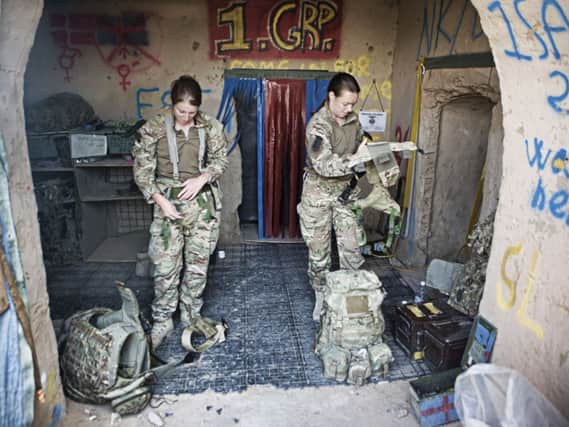Women could fight in ‘close combat roles’ by 2016


The prospect of women serving alongside men on the front line in armoured and infantry units for the first time has been raised in a Government- commissioned report.
At the moment, women are not allowed to serve in ground combat units where the primary role is to engage with and kill the enemy.
Advertisement
Hide AdAdvertisement
Hide AdUnder current rules, women are unable to serve with infantry battalions, armoured regiments and the Royal Marines.
Any move to give women close combat roles will prove highly controversial and last night veteran soldiers lined up to criticise the move.
The recommendation to open up the roles to women was made in a review led by Chief of the Defence Staff, General Sir Nicholas Houghton.
Making the change would bring the UK into line with the USA, Australia and Canada.
Yesterday Mr Fallon ordered an 18-month examination of training procedures and the physical demands of fighting to ensure that the change can be made without damaging female soldiers’ health.
He denied that this would mean “weakening” the training of frontline troops to make allowances for women’s physiques. Mr Fallon said: “Roles in our Armed Forces should be determined by ability not gender. I hope that, following further work on our training regimes and equipment, we can open up combat roles to women in 2016.
“This is a further sign of our commitment to maximising our talent in a year which has already seen the Royal Navy employ its first female submariners and two women climb to the highest-ever ranks in the RAF.”
Women currently serve in a variety of combat roles across the forces, including fighter pilots, sailors and submariners.
Advertisement
Hide AdAdvertisement
Hide AdFurther research will evaluate the physical demands of fighting on the front line and how it may impact women’s health, while training regimes to allow women to integrate will also be explored.
The Ministry of Defence said the review had ended the view that women joining men in combat roles would have an “adverse effect on cohesion”.
One argument against putting females in the front line has been that close relationships would inevitably develop between young men and women, which could affect behaviour in close-knit units. It has also been argued that women lack the physical strength required in battle zones and that violence goes against their nature.
Colonel Richard Kemp, a former commander in Afghanistan, has previously said women lack the “killer instinct” necessary to fight in close combat.
Yesterday Col Kemp said: “Inclusion of women in the infantry is certain to result in a lowering of physical standards despite the inevitable denials that this will happen.
“This would damage the fighting capabilities of the armed forces. It would be harmful to the cohesion of the army because of the nature of the role.”
Colonel Mike Dewar - a military historian who served in Cyprus, Borneo and Northern Ireland – told BBC Radio Scotland: “Upper body strength in 99.9 per cent of women does make it virtually impossible for them to pass the stringent physical tests which the infantry require.”
But as the leader of the Government review, Sir Nicholas took a different view: “I look forward to the prospect of opening ground close combat roles to women, but we have to look at this in a responsible way.”
Advertisement
Hide AdAdvertisement
Hide Ad“Our aim must be to maximise the use of talent without compromising our standards or undermining capability.”
He was supported by Mr Fallon, who said: “The review makes clear that there’s no question mark over the cohesion of the unit, the overall effectiveness of the unit. Women can fight just as effectively as men.
“But we do need to make sure that the physical training regimes we have at the moment, which are designed for men, can be improved so that we can doubly check that they are just as effective for women.”
Mr Fallon said women were accepted into police firearms units, and that female firefighters had to conduct arduous tasks including carrying heavy hoses.
He added: “I hope to lift the ban, subject to some final research over the next year or so into the long- term effect on women of the training regimes.”
Former Army officer Ashley Merry said: “Women are already on the front line doing a very real job very effectively. In reality there’s very few posts that are not open to women and women have moved so far in the armed forces. This is not the time to be experimenting with something new to be politically correct.”